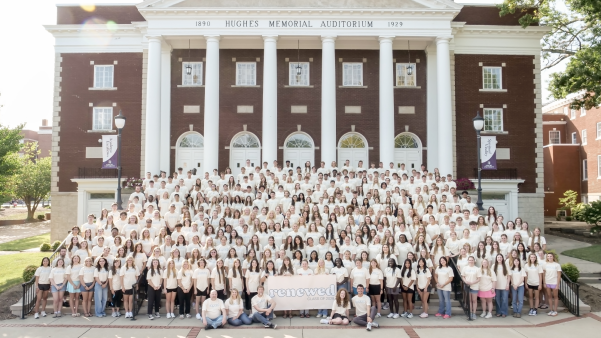I rarely read chick lit, but I couldn't walk past the Jesus bobble head on the cover of Sarah Healy's Can I Get an Amen? without flipping it open. And after reading the first few pages—which include apple juice at Sunday school, Christian camp and friendship bracelets, and "a Match.com type of deity" who wants to have a "relationship with you, Ellen!"—I decided to take the book home.
I finished Healy's debut novel, out recently from NAL Trade/Penguin, in an afternoon, and considered it one well spent. Though it deals too realistically with some touchy subjects to fit well in the Christian chick lit category, the book is shot through with a faith both complex and charitably cast.
Four pages in, a four-letter word answered my first question: why Healy hadn't gone with a Christian publishing house.
The story deals with the broken lives and messy relationships surrounding recent divorcee Ellen Carlisle. The book follows the 31-year-old's move back home with her cheery, conservative Christian parents after Ellen's husband leaves over her inability to conceive.
As Carlisle tries to rebuild her life, she faces an outspoken mother who, for instance, asks for public congregational prayer for the divorce and infertility, a father who keeps secrets, a gay brother, an outcast sister, and old high school friends and enemies with unexpected adult problems. At first, Ellen copes with her divorce by flirting with strangers at bars as often as she can. When one such evening nearly ends in disaster, she meets a man named Mark. Throw in a few faith-based twists, and you can probably take the enjoyable, albeit somewhat predictable, plot from there.
There are a solid half-dozen reasons Healy's book would never make it to the shelves of a Christian bookstore. Can I Get an Amen? covers nearly every hot-potato social issue, including adultery, abortion, homosexuality, and suicide. Rather than painting these topics in black and white categories, Healy gives them human faces and compels the reader to think through them as they affect real people. Ellen makes mistakes throughout the book as she struggles to move on from her divorce. And she must also come to terms with the Pollyanna-ish faith of a mother whose first words after the divorce are, "I know that you can't see it yet, but this is all a part of God's plan for you."
In fact, Ellen's mom is one of the book's surprises, a character who could easily have been the target for a big joke but instead is cast respectfully. Ellen's mother is kind and compassionate even while dealing with demons of her own. Too often it seems like lit—of the chick variety or otherwise—makes faith into a label that means a character should instantly deserve your respect or derision, depending on the book's publisher.
But Healy uses faith as another layer to add interest, color, and meaning to her characters without losing the nuance that makes all stories shine. Through Ellen, Healy sums up a feeling I imagine is familiar to many women after a painful split. Ellen gets uncomfortably drunk in bar after bar, because in her own words, she is a "wounded, pathetic divorcee who wanted, who needed, to believe that she was still beautiful … that she was still … a woman." Meanwhile, Ellen's mom isn't laughable or laudable because of her brand of Christianity; that faith is just part of what makes her a sometimes-sympathetic, sometimes-ridiculous character. The same goes for Ellen, who struggles throughout the book with the question of how much her faith really means to her.
Healy herself grew up in a large, evangelical Christian family in New Jersey. As a teen, she says, she was embarrassed by her parents' faith but now finds it "endearing." She has said she doesn't share their faith, but her respect for and understanding of it are evident in her writing. Healy could have used her voice to lampoon outspoken, charismatic Christianity. Instead, she treats it with an even hand. As Healy puts it in the book's endnote, "I wanted religion to serve as a medium for compelling, sympathetic characters." In spite of a few moments where I found characters and plot hard to believe, she succeeded with Can I Get an Amen? It would be exciting to see more authors follow her example.








